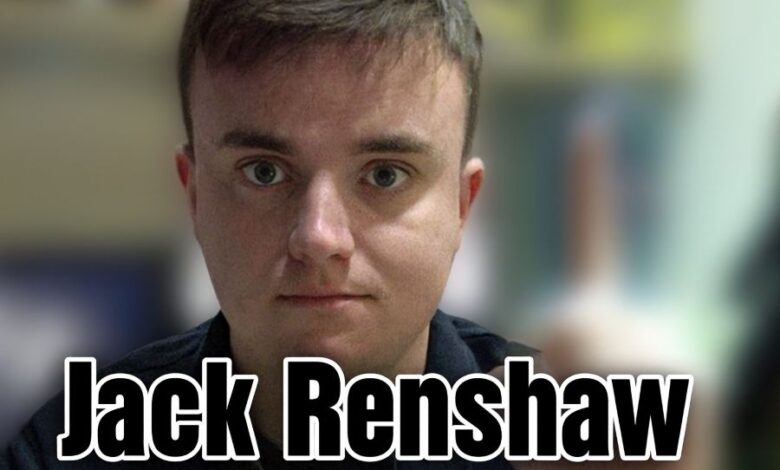Jack Renshaw: The Rise and Fall of a British Former Spokesperson for the Neo-Nazi Movement
How extremism, hatred, and radical ideology led to a life of crime and imprisonment

Table of Contents
ToggleIntroduction
Jack Renshaw is a name that has become synonymous with far-right extremism and radicalisation in modern Britain. Once known as a British former spokesperson for the neo-Nazi movement, his story is a powerful yet tragic example of how hate-driven ideologies can destroy potential, society, and the individual himself. Renshaw’s journey from a young political activist to a convicted terrorist reflects a deep moral decline and offers important lessons about the dangers of ideological manipulation.
Born in Lancashire, England, in 1995, Jack Andrew Renshaw gained notoriety for his extreme nationalist speeches and public allegiance to neo-Nazi organisations such as National Action and the British National Party Youth. His rhetoric quickly shifted from political dissent to racial hatred and violence. Eventually, his radical beliefs led to serious criminal acts, culminating in a life sentence for terrorism and grooming offences.
Quick Bio
| Full Name | Jack Andrew Renshaw |
|---|---|
| Date of Birth | 1995 |
| Birthplace | Ormskirk, Lancashire, England |
| Nationality | British |
| Education | Studied Economics and Politics at Manchester Metropolitan University |
| Profession | Former far-right activist and spokesperson |
| Known For | British former spokesperson for the neo-Nazi movement, terrorism convictions |
| Major Convictions | Preparing an act of terrorism, inciting racial hatred, grooming minors |
| Sentence | Life imprisonment with a minimum term of 20 years |
| Current Status | Imprisoned at HM Prison Wakefield |
| Legacy | Example of far-right radicalisation and counter-terrorism success in the UK |
Early Life and Education
Jack Renshaw was born in 1995 in Ormskirk, Lancashire, and raised in Skelmersdale, a working-class town in the North West of England. From an early age, he displayed a fascination with history and politics, which later took a darker turn toward extremist ideologies. His curiosity about nationalist movements led him to join British National Party Youth (BNP Youth) while still a teenager.
During his time at Manchester Metropolitan University, where he studied economics and politics, Renshaw’s views became increasingly radical. Instead of focusing on academic progress, he used his education as a platform to spread hate-driven beliefs. His involvement in university politics ended abruptly as his extremist statements and speeches drew public attention and disciplinary action from the university.
Entry into Far-Right Activism
Renshaw’s political journey intensified when he became one of the most outspoken voices of BNP Youth. His speeches were provocative and filled with hatred towards ethnic minorities, immigrants, and the Jewish community. These speeches, though shocking, earned him quick popularity among extremist groups and set the stage for his later association with National Action, a far-right organisation advocating white supremacy and anti-Semitism.
As a British former spokesperson for the neo-Nazi movement, Renshaw used public rallies, online videos, and social media to recruit young followers. His charisma and confidence were overshadowed by his dangerous rhetoric, which glorified Adolf Hitler and promoted violence. The UK government eventually banned National Action in December 2016, recognising it as a terrorist organisation — a move that would later seal Renshaw’s fate.
Crimes and Convictions
Jack Renshaw’s extremist path crossed the line from hate speech to direct criminal activity. In 2018, he was convicted for inciting racial hatred through his public speeches that targeted minorities. Investigations later revealed disturbing evidence of grooming minors online between 2016 and 2017. He used fake social media profiles to contact teenage boys and offer money for sexual acts.
The most shocking revelation came when authorities uncovered a terror plot he had orchestrated. Renshaw had purchased a large machete and planned to murder Rosie Cooper, the Labour MP for West Lancashire, and a police officer, DC Victoria Henderson, who was investigating his previous crimes. This plan was intercepted before execution, thanks to a tip-off from within extremist circles and the charity Hope Not Hate.
Sentencing and Imprisonment
In May 2019, at the Old Bailey in London, Renshaw was sentenced to life imprisonment with a minimum term of 20 years. The presiding judge, Mrs Justice McGowan, condemned him for his “perverted view of history and politics,” declaring that his ideology had transformed him into a threat to democracy and human life.
This sentence marked the end of his active involvement in far-right politics and exposed the violent underbelly of neo-Nazi movements in the UK. Renshaw’s imprisonment also served as a crucial reminder of how unchecked hate speech can evolve into domestic terrorism. Today, he remains incarcerated at HM Prison Wakefield, one of the most secure prisons in the country.
Ideology and Motivation
Renshaw’s ideology was built on a foundation of neo-Nazism, white supremacy, and anti-Semitic conspiracies. He consistently praised Adolf Hitler, calling him a “hero,” and promoted the idea of a racial war in the United Kingdom. His speeches often dehumanised minority groups and justified violence as a means of restoring what he called “racial purity.”
He believed that British society had been corrupted by multiculturalism and liberalism. However, his twisted sense of nationalism turned into a personal obsession that disconnected him from reality. By the time he plotted murder, he had lost all sense of political purpose, functioning only as a radical symbol of hate and paranoia.
Impact and Legacy
The case of Jack Renshaw has had lasting significance in Britain’s counter-extremism narrative. His radicalisation journey is often cited in academic research, counter-terrorism briefings, and documentaries as an example of how online hate, political manipulation, and extremist propaganda can push individuals toward violent acts.
Moreover, his arrest and conviction exposed the growing danger of organised far-right networks that exploit the internet to attract vulnerable youth. Renshaw’s downfall helped strengthen the UK’s counter-terrorism laws and public awareness around the threat of domestic extremist groups. While his name remains tied to hate and violence, the lessons from his case continue to guide prevention strategies against radicalisation.
Conclusion
Jack Renshaw’s life is both a warning and a lesson. From a university student to a British former spokesperson for the neo-Nazi movement, his descent into hatred illustrates how dangerous ideology can destroy not just society but also the individual himself. His story shows that when hatred becomes identity, destruction follows.
Today, his name stands as a symbol of how extremism corrodes the mind and isolates one from humanity. Yet, his conviction also represents victory for justice and tolerance — proof that the values of peace and democracy can overcome even the darkest ideologies.
FAQs
Q1: Who is Jack Renshaw?
Jack Renshaw is a British former far-right activist and spokesperson for the neo-Nazi movement, convicted for terrorism and child-sex offences.
Q2: What organisation was he part of?
He was associated with BNP Youth and the banned terrorist organisation National Action.
Q3: What crimes did Jack Renshaw commit?
He was convicted of preparing an act of terrorism, inciting racial hatred, and grooming minors online.
Q4: What was his sentence?
He received a life sentence with a minimum of 20 years in prison in 2019.
Q5: Where is Jack Renshaw now?
He is currently serving his sentence at HM Prison Wakefield, one of the UK’s high-security facilities.
Q6: What is his legacy?
His case serves as a cautionary example of far-right radicalisation and the dangers of extremist ideologies in modern society.



